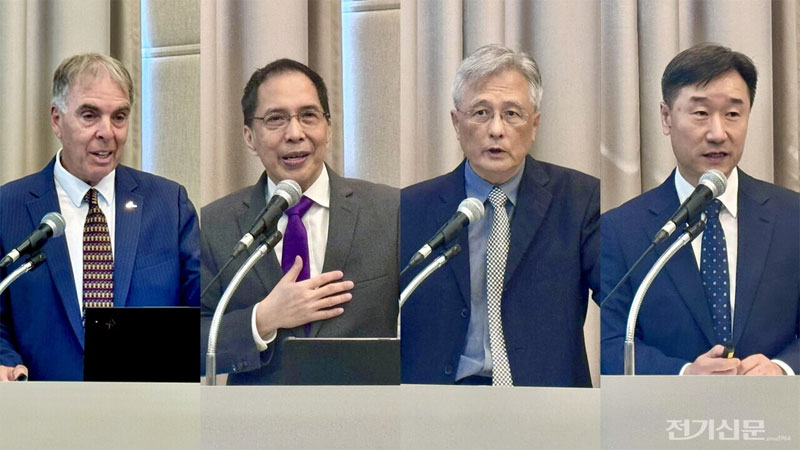Key speakers take turns in delivering presentations during the Global ESCO Seminar 2025 held in Busan, from left: Pierre Langlois, Co-chair of the Global ESCO Network and President of Econoler; Alexander Ablaza, Founding Convenor and Co-chair of the Asia Pacific ESCO Industry Alliance (APEIA) and CEO of Climargy; Hung-Yao Cho, President of the Taiwan Energy Service Association (TESA); and, Dr. Ki-Hyun Park of the Korea Energy Economics Institute (KEEI). (Photo: Electricity Times)
BUSAN, SOUTH KOREA, August 28, 2025 – Climargy was among the pioneer private super ESCOs spotlighted in a presentation delivered by the Asia Pacific ESCO Industry Alliance (APEIA) during the Global ESCO Seminar 2025 held earlier today in the Busan Exhibition and Convention Center.
APEIA founding convenor and co-chair and Climargy CEO Alexander Ablaza explained the valuable role of a Super ESCO as an aggregator of ESCO projects. He said, “A Super ESCO combines multiple small ESCO projects into a single, investable portfolio. This aggregation helps overcome the challenge of limited access to bank financing faced by individual ESCOs. The Super ESCO attracts corporate equity and commercial financing by presenting energy efficiency as a distinct asset class, while it acts as a fund-like entity, channeling investment into aggregated projects.” He went on to present the other positive impacts of portfolio aggregation. He said, “A Super ESCO contracts directly with host customers and then subcontracts private ESCOs to implement energy-saving measures. It also mitigates project preparation and investment risks for investors and developers. Lastly, the aggregation structure addresses market failures by scaling up energy efficiency finance and implementation, especially in regions where ESCOs are nascent or undercapitalized.”
Ablaza declared that the creation of a Super ESCO can be considered as a key strategy to remove several entrenched barriers that have historically hindered the growth and scalability of energy efficiency projects through traditional ESCO models. He warned however, “It is however imperative that the design of a Super ESCO strengthens and does not compete with the private ESCOs in any market.”
After presenting various public Super ESCOs established from 1996 to 2020 in Europe and the Middle East, Ablaza also presented two pioneering private Super ESCOs – Climargy established in the Philippines in 2020, and SOFIAC in Canada in 2021.
According to Ablaza, Climargy aggregates ESCO project assets in the commercial and industrial (C&I) sector with off-balance sheet equity capital invested through Build-Own-Operate-Maintain-Transfer arrangements with C&I Host Entities backed by ESCO performance contracts. Ablaza explained further, “It enables ESCOs to pursue more C&I performance contracts with up to 100% project capital flowing outside ESCO and host entity balance sheets. It mobilizes equity and debt capital from energy conglomerates and infrastructure investors. Climargy likewise mobilizes development funding to de-risk project preparation and long-term investments.”
Joining Ablaza as key speakers in the Global ESCO Seminar 2025 were Pierre Langlois, Co-chair of the Global ESCO Network and President of Econoler, Hung-Yao Cho, President of the Taiwan Energy Service Association (TESA), and Dr. Ki-Hyun Park, Senior Research Fellow, Energy and Climate Policy Research Group of the Korea Energy Economics Institute (KEEI).
The Global ESCO Seminar 2025 was organized by the Korea Association of ESCO (KAESCO) in collaboration with the Korea Energy Agency (KEA).
Sources: Climargy / Asia Pacific ESCO Industry Alliance (APEIA) / Electricity Times


